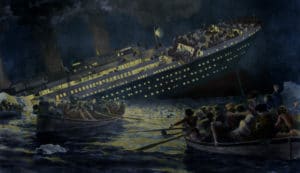The Titanic’s Wireless at the Heart of a New Lawsuit
This mission to the Titanic is not about a mythical diamond. It’s not about scientific discoveries. It’s not about amazing deep sea footage. It is about a Marconi wireless telegraph machine, and it has triggered a major lawsuit by the US federal government.
Let’s first take a moment to discuss the Titanic and its status at the current time. The United States and the United Kingdom have an agreement that ensures the Titanic and the shipwreck site are recognized as “a memorial to those men, women, and children who perished and whose remains should be given appropriate respect.”
The remains of the ship are also in a very fragile condition, and so it has also been agreed that any visits to the ship cannot alter it physically or disturb it in a way that might compromise its integrity further. This means that no one enters the hull sections, whether it is to perform salvage operations or even conduct explorations.
What about gathering artifacts before the ship does finally collapse and bury whatever could be salvaged? That is at the heart of this current lawsuit. When the salvage firm RMS Titanic Inc. announced it would be heading to the wreck to salvage the ship’s Marconi wireless telegraph machine, US attorneys immediately filed a legal challenge in Norfolk, VA. They say that a salvage mission of this kind would break the pact between the US and the UK.
In the suit, the government indicates that the salvage firm would require authorization from the Secretary of Commerce before heading into the wreckage and that such authorization would be unlikely.
This is because of the location of the “artifact,” in question. The wireless telegraph was located in a deckhouse stationed close to the famous grand staircase. A deep-sea submersible would have to slip through one of the skylights of the ship in order to retrieve the device. If it is too small an aperture, though, the machine would have to be used to cut into the roof.
The US government’s challenge has already faced some resistance as a US district judge said the salvage firm could move forward with their operation. The logic behind that decision is two-fold. The Marconi wireless telegraph machine is historically significant. Second, the judge said, it is at risk of being lost altogether if the ship’s condition worsens. According to an article from the Boston Globe, the judge said that “recovering the telegraph would contribute to preserving the legacy of the ship and its passengers.”
Yet, it is that very concept that has some worried. George Rutherglen, for example, is a law professor who teaches admiralty law at the University of Virginia. He says that giving this salvage company permission to make such an invasive visit into the Titanic would effectively open the door to others to make a similar request and do much worse kinds of salvage operations.
He agrees that the salvage firm should be seeking to make its investment back, and that they are looking to recover as many artifacts as they ethically can.
Why the Marconi wireless telegraph machine in the first place? The story of the Titanic is legendary. The salvage firm says that they intend to retrieve it and then use it in an exhibition that would tell the stories of the people who broadcasted the ship’s distress calls in its final hours afloat.
The ship is the resting place for hundreds of the original 2,208 passengers on board when it sank in 1912. The roughly 700 survivors were able to be quickly retrieved because of the signals sent out by the operators of the Marconi wireless telegraph machine.
Like a ghost that continually reappears, the Titanic remains with us and this lawsuit is just another example of how it will continue to intrigue millions.

